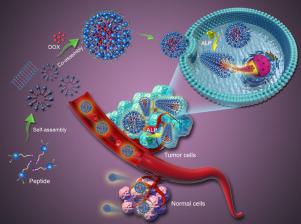Biomaterials Advances ( IF 5.5 ) Pub Date : 2021-08-25 , DOI: 10.1016/j.msec.2021.112389 Zexin Hong 1 , Xirui Sun 2 , Xiumei Sun 2 , Juanjuan Cao 1 , Zhengqiang Yang 3 , Zhifang Pan 1 , Tao Yu 1 , Jinhua Dong 1 , Baolong Zhou 4 , Jingkun Bai 1

|
Nanocarriers have been widely employed to deliver chemotherapeutic drugs for cancer treatment. However, the insufficient accumulation of nanoparticles in tumors is an important reason for the poor efficacy of nanodrugs. In this study, a novel drug delivery system with a self-assembled amphiphilic peptide was designed to respond specifically to alkaline phosphatase (ALP), a protease overexpressed in cancer cells. The amphiphilic peptide self-assembled into spherical and fibrous nanostructures, and it easily assembled into spherical drug-loaded peptide nanoparticles after loading of a hydrophobic chemotherapeutic drug. The cytotoxicity of the drug carriers was enhanced against tumor cells over time. These spherical nanoparticles transformed into nanofibers under the induction of ALP, leading to efficient release of the encapsulated drug. This drug delivery strategy relying on responsiveness to an enzyme present in the tumor microenvironment can enhance local drug accumulation at the tumor site. The results of live animal imaging showed that the residence time of the morphologically transformable drug-loaded peptide nanoparticles at the tumor site was prolonged in vivo, confirming their potential use in antitumor therapy. These findings can contribute to a better understanding of the influence of drug carrier morphology on intracellular retention.
中文翻译:

酶诱导的药物载体形态转变:对细胞毒性和抗肿瘤药物保留时间的影响
纳米载体已被广泛用于输送用于癌症治疗的化疗药物。然而,纳米颗粒在肿瘤中的积累不足是纳米药物疗效不佳的重要原因。在这项研究中,设计了一种具有自组装两亲性肽的新型药物递送系统,以特异性响应碱性磷酸酶 (ALP),这是一种在癌细胞中过度表达的蛋白酶。两亲性肽自组装成球形和纤维状纳米结构,并在负载疏水性化疗药物后很容易组装成球形载药肽纳米颗粒。随着时间的推移,药物载体对肿瘤细胞的细胞毒性增强。这些球形纳米粒子在 ALP 的诱导下转化为纳米纤维,从而有效释放封装的药物。这种依赖于对存在于肿瘤微环境中的酶的反应的药物递送策略可以增强肿瘤部位的局部药物积累。活体动物成像结果表明,形态可转化的载药肽纳米粒在肿瘤部位的停留时间延长体内,证实了它们在抗肿瘤治疗中的潜在用途。这些发现有助于更好地了解药物载体形态对细胞内滞留的影响。









































 京公网安备 11010802027423号
京公网安备 11010802027423号